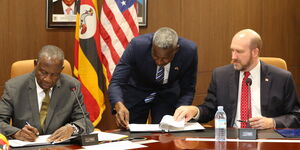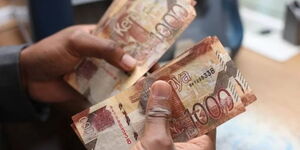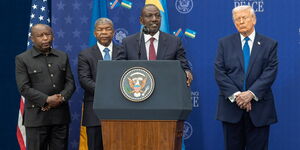President William Ruto’s economic advisor, David Ndii, has defended the latest revelations that Kenya has spent Ksh1.5 trillion on fuel imports from three Gulf countries through the Government-to-Government (G-to-G) fuel deal over the past 18 months.
The G-to-G deal, initially designed to ease forex pressure and stabilise fuel imports, has now cost the country Ksh1.5 trillion. The staggering amount elicited a heated debate among Kenyans, prompting Ndii to respond and defend it.
Critiques argue that the deal is proving to benefit the Gulf oil firms more than Kenyan consumers, with fuel prices remaining high despite promises of relief.
According to Ndii, the amount spent so far tallies with what Kenya consumes monthly in petroleum products, showing that the amount earned by the three Gulf companies coincides with the country's consumption, making the total expenditure unsurprising.
''Three Gulf oil firms sold Kenya Ksh1.5 trillion. This clickbait simply tells you that we consume Ksh800 billion worth of petroleum products a month,'' Ndii said.
The Ruto advisor was responding to the concerns on the amount that has been used so far and why the deal had been extended for a further two years until 2028 despite the cost it has on Kenya's economy.
Upon calculating Kenyans.co.ke found that Ksh1.5 trillion divided by 18 months results in Ksh83.3 billion per month. While it is still unclear whether Ndii's calculations were erroneous, his statement was still aimed at defending the G-to-G deal.
The G-to-G Kenya fuel deal was meant to reduce the dollar demand by allowing Kenya to import fuel on a credit basis rather than purchasing it on the open market.
According to the Ministry of Energy and Petroleum, the three Gulf Oil Companies, which are Saudi Aramco, National Oil Co and Abu Dhabi National Oil Co, will continue to supply gasoline, diesel, kerosene and jet fuel under a 180-day credit plan until early 2028.
The extension marks a change of heart for Kenya, which had in November told the International Monetary Fund that it would exit from the deal following concern over inconsistencies and contradictions of fuel volumes, forex market distortions, and economic risks.
This followed a warning from the IMF, which had pointed out that Kenya might be forced to compensate the Gulf firms for failing to agree to meet the agreed fuel import volumes.
The Ministry defended the extension, arguing that the deal has helped to stabilise the shilling and reduce the fuel prices from Ksh217 to the current Ksh174.63, Ksh164.86, and Ksh148.99 for super petrol, diesel, and kerosene, respectively.
While the government argues that the extension will maintain economic stability, critics argue that it could worsen the country's debt burden and limit future fuel import flexibility.












